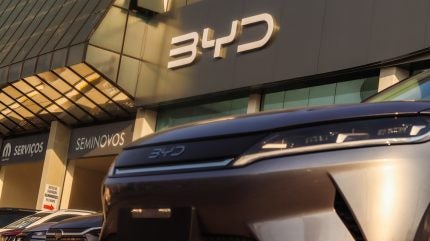
BYD has initiated the sale of its electric vehicles (EVs) in the Argentine market, reported Reuters.
The vehicles introduced to the Argentine market include the electric Dolphin Mini, electric Yuan Pro sports utility vehicle (SUV), and the Song Pro plug-in hybrid SUV, all priced below $16,000 before taxes and fees.

Discover B2B Marketing That Performs
Combine business intelligence and editorial excellence to reach engaged professionals across 36 leading media platforms.
This pricing strategy aligns with Argentina’s new policy that permits the import of up to 50,000 electric and hybrid vehicles duty-free in 2026.
According to Reuters, the Argentine market, traditionally dominated by Chinese automotive brands in the electric and hybrid segment, is poised to receive an influx of around 40,000 such vehicles by the end of January.
Normally, vehicles imported from non-Mercosur countries that lack local manufacturing facilities in Argentina are subject to a 35% import duty.
BYD’s Argentina country manager, Stephen Deng, has indicated that the company is set to import approximately 7,800 electric and hybrid vehicles under Argentina’s new import quota.
The tariff exemption is expected to predominantly benefit competitively priced Chinese carmakers like BYD, which is actively expanding in the South American region, the news agency added.
Despite being the second-largest car market in South America, Argentina has the lowest penetration of EVs in the region.
High import costs due to “unfavourable exchange rates” have previously made it difficult for EVs to compete with locally produced combustion engine vehicles.
Argentina’s Association of Automotive Dealers (ACARA) president Sebastian Beato acknowledged the consistent vehicle sales despite economic fluctuations and political instability, saying, “Amid all these ups and downs, we’ve continued selling vehicles at a more than acceptable pace.”
BYD’s growth in Brazil, where the company has a new factory, has faced opposition from local industry and labour unions concerned about the potential impact on domestic auto jobs and production.
The company, which is witnessing rapid global expansion, is also navigating competitive pressures from rivals like Geely Auto and Leapmotor.
BYD has adjusted its global sales projection for 2025 downward by 16% to 4.6 million vehicles, a decrease from the previously anticipated 5.5 million units, as per a Reuters report citing informed sources.






